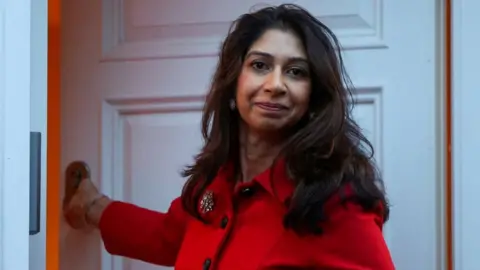What was the strategy behind Rishi Sunak’s reshuffle?
Rishi Sunak's new cabinet meets for the first time this morning, as his new look government takes shape.
At 23:00, the announcements were still coming, and it's not just David Cameron doing a less senior job than their previous role.
Dame Andrea Leadsom used to be a cabinet minister as business secretary - she once ran for Conservative leader and prime minister - now she's back as a junior health minister.
Damian Hinds used to be education secretary. Now he's number two in the department as minister of state.
But let's take a step back. What is this reshuffle all about?
From Rishi Sunak's perspective, it is about building a team more in his own image, and shaking off at least some of the folk he inherited from Liz Truss.
It is also about trying to change the political dial.
I'm told Rishi Sunak and David Cameron have spoken every now and again since Mr Sunak became prime minister.
It was about a week ago when Lord Cameron, as he now is, was asked if he would become foreign secretary.
This suggests - given the sideways move for James Cleverly from foreign secretary to home secretary - that Suella Braverman may have been done for even without the drama of late last week.
But Mrs Braverman's remarks did, it appears, shuffle forward the reshuffle.
Lord Cameron's return has prompted genuine delight from some Conservatives.
I've seen texts flying around talking excitedly about "DC" - his initials were often used as shorthand when he was prime minister.
But others in the party see him as a Conservative from a different era: the Remain-loving author of what some see as the austerity years. For some Conservative MPs they are two things they would run a mile from.
Governments will often appoint blasts from the past to senior roles, via the House of Lords, when they've either run out of better ideas or really do need to give the impression they're patching up very public differences.
Think Lord Mandelson as the unlikely number two to Gordon Brown in the final years of Labour's last stint in government.
As for Suella Braverman, No10 got rid of her because they were tired of her.
On plenty of policy issues she and the prime minister agreed. But her language and the attention it attracted irritated them, as did that article she wrote for The Times that wasn't properly signed off by No10.
A former minister, Dame Andrea Jenkyns, has published her letter of no confidence in Rishi Sunak.
Some of Suella Braverman's supporters claim - without evidence - a dozen or so letters have been sent in private. Who knows.
The numbers of the disillusioned MPs tempted by political insurrection don't seem big, at least not yet.
But make no mistake, No10 is aware of them.
 Reuters
ReutersMrs Braverman hasn't yet properly had her say after her early morning sacking by phone.
Some think she may wait until after the decision on Wednesday from the Supreme Court about the Rwanda migrant plan.
If the government loses, Suella Braverman isn't likely to stay quiet for long.
And senior folk in government think losing on Rwanda in court is more likely than winning.
But a qualified loss (or indeed qualified win) is possible, where some elements of the scheme are approved and others aren't.
The question is how much attention can Suella Braverman attract, how much appetite does the Tory party still have for stirring things up before an election - as opposed to making a case for its priorities afterwards? Let's see.
What is noticeable - and the return of David Cameron personifies - is what seems like a tilt away from the right.
The re-appointment of Esther McVey is a nod to those who might be concerned about this, charged as she is with keeping a sceptical eye on what some label political correctness or "wokery".
But the broader shift looks unmistakable to some in the party, and they don't like it.
Others hope it can shore up Conservative support in the south of England, where the electoral threat to the Tories by the Liberal Democrats is at its keenest.
Others, not least in the Labour Party, ask whether all this amounts to a coherent strategy at all, given it is only weeks ago that Rishi Sunak was seeking to define himself against recent governments and prime ministers.
And now he's appointed one as his foreign secretary.
Oh and one final thought, which in the end is all that really matters with all this.
Will it change how we are governed, and the popularity, or lack of it, of the government?
There is a chance given its scale, and the eye-catching return of David Cameron, that people might notice it.
Internal Conservative critics reckoned the prime minister's conference speech and last week's King's Speech didn't change the political dial.
It is far from certain this personnel reboot will either, but it might.
If you are Rishi Sunak and you are staring at what looks right now like likely general election defeat, it is worth a try.